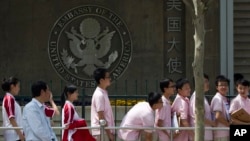Student Union
Foreign Students Frustrated by OPT Delays
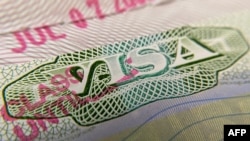
When Peter, a Muslim student from China, graduated from Texas A&M University in December 2020, he thought he would be working at a Texas consulting firm by early January.
Instead, the international STEM graduate is sitting in his apartment in Houston, waiting for the results of his Optional Practical Training (OPT) application. OPT is a temporary work visa that allows international students to extend their U.S. student visas by 12 to 36 months.
“Normally, it takes two to three weeks to get a receipt [notice] and then… it’s supposed to take about three months, to get an employment authorization document,” immigration Attorney Greg Siskind said in a video interview. “In this case, we were already hitting almost three months without even having a receipt, much less getting a decision on the document.”
Peter was eventually notified that his forms had been received by the U.S. Citizenship and Immigration Services (USCIS): 116 days after mailing them to a U.S. secure federal facility in Dallas – called a lockbox – that receives forms and applications, and processes payments. Now, he waits up to eight more months for approval.
“I don’t have income while I’m still paying the lease. I don’t have health insurance since I’m technically unemployed. My apartment had a power outage and ran out of hot water because of the massive snowstorm last week,” he told VOA in an online interview. “The waiting period is unknown. And I think in the U.S., if you want the government to fix this problem in a quick manner, you have to sue them.”
On February 16, Peter and 17 other named plaintiffs from China filed a class-action lawsuit against USCIS in the District Court for the Southern District of Ohio.
The suit demands the agency “open, process and adjudicate applications,” according to their OPTActionLogs website.
Robert Cohen, the case’s lead attorney, said there may be “several thousand” international students who are affected by the OPT delays. The students have been waiting for months, when it only should have taken weeks, he said.
“I’m one of the luckiest because my employer was really considerate and pushed my starting date,” Peter said. “But many people I know have lost their job offer due to the delays and even had to head home.”
USCIS released a formal statement January 8, acknowledging the delays, attributing them to “the COVID-19 pandemic and other factors.” It was USCIS’ first public statement since the delays began in October.
On February 26, USCIS posted a second public statement responding to the long delays, giving affected applicants a 14-month OPT period of flexibility and a chance to refile certain rejected applications.
WeChat group fights delays
OPT's temporary employment program allows international students with F-1 visas to work in their major area of study for a total of 12 months before or after graduation. Students pursuing degrees in science, technology, engineering and math (STEM) fields are eligible for a 24-month OPT extension.
Applicants typically apply up to 90 days before completing their degree by mailing forms to one of USCIS’ lockbox locations: Texas or Arizona. The current delays have affected students applying for post-completion OPT extension; students in the pre-completion OPT program have not experienced delays.
Peter said he noticed in late November that the application receipt waiting period seemed to drag on longer than usual. Finding others in similar situations on 1Point3Acres, a Chinese community forum, he started a WeChat group chat to share their experiences with the ongoing delays. As of February 25, over 600 people had joined.
All student sources in this story have requested anonymity because they said they feared retaliation.
Managing delays
Zhang, a computer science graduate from Brandeis University in Massachusetts, said she has had to ask her manager to push back her work start date twice: first to February 15 and now to March 29.
Li, a STEM OPT extension applicant, said he had lost his job because of the delays. Denied an extension and now jobless, he has since re-applied, hoping for an approval.
Other graduates, while waiting for their employment authorization documents (EAD), worry about their lack of health insurance. Unenrolled and unemployed, many graduates are left without it.
Frustrated at the lack of active solutions from USCIS, Long, a graduate of Brown University in Rhode Island, explained that he has received the same automated responses when he emails USCIS about his delayed OPT status and delays.
USCIS
USCIS initially announced a 45-day to four-month waiting time for OPTs. But Peter said he noticed the USCIS Processing Times website updated on February 22 that an extension to “3-8 months” processing time had been made.
“USCIS has been transparent about the delays in processing and scheduling caused by COVID-19 and other external factors,” the agency stated on February 26.
“The agency has taken numerous steps to help noncitizens address immigration-related challenges during the national [COVID-19 pandemic] emergency; and USCIS will continue to explore flexibility options and stakeholder recommendations to minimize those delays,” it wrote. “The agency recognizes the ongoing impact COVID-19 has had on nonimmigrant students and the noncitizen community as a whole, and USCIS appreciates the understanding it has received over the last year.
Diane Rish, associate director of government relations at the American Immigration Lawyers Association, told VOA in January that “applicants across a wide variety of visa categories are being impacted by these receipt notice delays.” She said the delays were caused by “an uptick in filings” in general because of an anticipated fee increase, an increase in green card filings, and a favorable processing date of October 13 that encouraged another surge.
“Maybe they really run out of people processing,” Long said. “But … we’re forcing them to change by filing the lawsuit because I believe, in America, this is the only way to try to force government agencies to do anything.”
“These [delays] affect our future confidence in studying in the U.S. We first saw that the U.S. was welcoming to all the international students or immigrants from all kinds of backgrounds,” Long said.
Cautiously optimistic
While waiting for their EAD cards and the lawsuit’s result, Zhang and Long have become friends and shared their cautious optimism during the uncertainty.
“At first, I was panicking and afraid of losing my job offer and legal status in the U.S. But then I realized that it’s a massive delay, not just me,” Zhang said as she emphasized the significance of representing the international student community rather than herself. “I just want justice for the students,” she said.
Although attorney Cohen is unsure when the case will be settled, he said he is “confident” that they will reach an agreement with the government.
“We’re hopeful that that will provide relief for all the students and put the students back in the position that they would have been in had they not delayed with the receipts like this,” Cohen said.
See all News Updates of the Day
- By VOA News
International students discuss US campus culture shock

International students at De Anza College in Cupertino, California, talked about culture shock in an article in La Voz News, the student newspaper.
"It felt like a major culture shock. Everything was so different, from academics to mannerism," said a student from Mexico.
Read the full story here.
These are the most expensive schools in the US
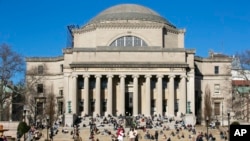
High tuition costs along with housing and food expenses can add up for students at U.S. colleges and universities.
MSNBC looked at the most expensive schools in the country, with one costing more than $500,000 for a bachelor’s degree. (June 2024)
Uzbekistan students admitted into top US universities
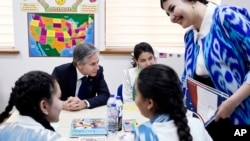
Students from Uzbekistan are among the international students admitted to top colleges and universities in recent years.
Gazata.uz profiled some of the Uzbekistan students attending Harvard, Brown, Princeton and other U.S. universities. (June 2024)
- By Stella Hsu
Reports of visa checks, deportations worry Chinese STEM students in US
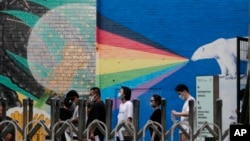
Geopolitical tensions and growing competition in tech between the United States and China appear to be spilling over into academia despite commitments from the world’s two biggest economies to boost people-to-people exchanges.
The United States remains the top choice for Chinese students seeking to study abroad with nearly 300,000 studying in American colleges and universities during the 2022-2023 school year. But reports of some cases that students and professors are facing extra scrutiny while passing through immigration and the deportation of others are raising concerns.
For Chen Xiaojin, a doctoral student studying semiconductor materials at a university in the Washington, D.C., metropolitan area, it has been six years since she returned to her hometown of Beijing.
At first, it was the COVID-19 pandemic that kept her from going home. But over the past two years, she has been deterred by accounts of Chinese students majoring in science and engineering being required to reapply for their visas upon returning to China.
She also says she is worried by reports over the past six months of Chinese students being deported, even at nearby Dulles Airport.
"My current research is relatively sensitive, and my boss [adviser] is getting funds from the U.S. Department of Defense, making it even more sensitive,” she told VOA. "I am afraid that I won't be able to return after I go back [to China]."
Chen says that if she did return to China, she would have to apply for a new visa.
In a report late last month, Bloomberg said it had found at least 20 Chinese students and scholars with valid visas who were deported at U.S. Customs since November and barred from reentry. The U.S. Customs and Border Protection Agency does not release relevant data.
Immigration attorney Dan Berger represented one Chinese student who was deported late last year. He tells VOA Mandarin that the student studied biological sciences at Yale University and was about to complete her doctorate.
She visited her family in China and got a new visa but was deported by customs at Dulles Airport and barred from reentering the country for five years. Berger said he did not see anything suspicious in the transcript of the conversation between the student and the customs officer.
"We have seen what seems like a pattern over the last six months of Chinese PhD students being turned around…. more than I've seen in quite a while," he said.
Matthew Brazil, a fellow at the Jamestown Foundation, said neither country seems willing to explain the situation. However, he believes that in most cases, the United States must have valid reasons for blocking visa holders from entering the country.
In some cases, the student’s background may not match what is written on the visa application. In other cases, customs agents may also find something that the State Department missed, and once they see it, they are responsible for taking action.
"I wish the Chinese side would be specific about their students who were refused entry,” he said. “The fact that both sides are mum on details and that the Chinese side is engaged with the usual angry rhetoric means that each has security concerns. And that says to me that there was good reason for the U.S. to stop these particular applicants."
Brazil also sees a connection between the entry denials and export control regulations issued by the United States in October 2022 that restrict China's ability to obtain advanced computing chips, develop and maintain supercomputers, and manufacture advanced semiconductors.
U.S. Customs and Border Protection is one of the law enforcement agencies authorized to investigate violations of export control regulations, he said.
"Beijing's intelligence agencies are known to focus attention on PRC [People's Republic of China] students and scientists headed abroad who study or work on dual-use technologies controlled under the Export Administration Act — compelling Chinese students and scientists to report on what they've learned when they return to China on holiday,” he said. “This has been true for decades."
Bill Drexel, a fellow for the Technology and National Security Program at the Center for a New American Security, said the U.S. government did find some cases where students tried to steal strategic technology for China.
"I think it would both not be surprising that they found some really questionable or incriminating evidence for some students,” he said. “It would also not be surprising if, in their hunt for really solid evidence, they also may have made some mistakes on other students.”
Drexel adds that “it’s just kind of an unfortunate fact of the time that we live in and the tactics that the CCP uses when it comes to these measures."
In a post on X in early May, U.S. ambassador to China Nicholas Burns tried to dispel concerns about visas and entry to the United States for students and scholars. In the post, he said "99.9% of Chinese students holding visas encounter no issues upon entering the United States.”
In an interview with The Wall Street Journal Monday, Burns said it is China that is making it impossible to promote people-to-people ties. Burns told the Journal that students attending events sponsored by the United States in China have been interrogated and intimidated.
He also said that since U.S. President Joe Biden and China’s leader Xi Jinping held their summit in San Francisco last year, China’s Ministry of State Security and other agencies had interfered with Chinese citizens’ participation at some 61 events.
At a regular briefing on Wednesday, Chinese Foreign Ministry spokesperson Mao Ning dismissed those accusations, saying that they did not “reflect reality" and that went against key understandings reached by both countries’ presidents in San Francisco.
“The United States, under the pretext of 'national security,' unjustifiably harasses, interrogates, and deports Chinese students in the U.S., causing them significant harm and creating a severe chilling effect,” Mao said. “The image of the United States in the minds of the Chinese people fundamentally depends on the actions of the United States itself.”
Drexel said he believes Burns’ comments about visas and students' willingness to study in the U.S. still ring true.
“On balance, it's still the case that American universities are overwhelmingly warm towards Chinese students and want them in large numbers," he said.
However, Berger, the immigration lawyer, is concerned about the chilling effect recent cases involving Chinese students could have.
"In general, we are being more careful about advising Chinese graduate students in STEM fields about traveling and letting them know that there is some small risk,” he said.
Even though the risk is small, it does seem to be real at the moment, he said.
Adrianna Zhang contributed to this report.
US federal judge blocks new regulation targeting for-profit colleges
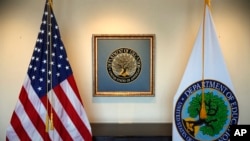
A federal judge in Texas has blocked a regulatory provision targeting for-profit colleges that was scheduled to take effect in July 2024.
Times Higher Education reports that the rule, which would affect student loans, was challenged by for-profit institutions. (June 2024)





